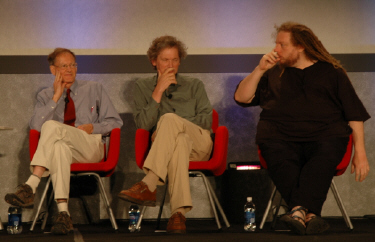Is technology making us safer?

"Is Technology Making Us Safer" was the most entertaining and bleak panel at the AO2005 Summit. Paul Saffo, Director and Roy Amara Fellow at the Institute for the Future, moderated the event, refereeing exchanges among the curmongeonly George Gilder, author and editor of the Gilder Technology Report; a rather joyless Bill Joy, Sun cofounder, author of "Why Technology Doesn't Need Us," and now a VC at Kleiner Perkins Caufield & Byers; and the lucid Jaron Lanier, computer scientist, composer, visual artist and author.

From left: George Gilder, Bill Joy and Jaron Lanier
Joy started out by exposing his greatest technology fear--the increasing power of an individual to do catastrophic harm whether via a virus that runs through the Net causing economic damage or a manufactured or engineeered biological agent with the potential to kill millions. "We have to find a way through public policy to deal with the assymetric capability of a single actor to use the power of exponential to create an epidemic," Joy said.
George Gilder, the fire breathing, libertarian dragon, followed Joy's remarks, saying how amazed he was by the "damage to Bill's brain inflicted by one biological encounter in Aspen with Amory Lovins," calling Joy "one of most valuable minds in world," but a "menace to society and freedoms" because of his stance on restricting technology, such as bioengineering data, such as the gene sequence of pathogens. "Free societies are safer when technology moves faster," Gilder said. In a later interview that will air on the Gillmor Gang, Gilder said that putting massive scientific energy into preventing pathogens, compared the infinitesimal number of people who want to unleash pathogens, mandates that technology be open, which will drive more rapid technological advances.
Gilder's AO2005 rant went on: "The greatest wisdom expressed on the subject is by Edward teller--the inventor of the hydrogen bomb--who observed that after World War II, the U.S. could not even compete with the Soviet Union in nuclear and rocket technology which we classified and rendered secret. The reason the Soviet Union didn't dominate the world is because the U.S. didn't control computer technology, so people like Joy and Lanier could contrive fabulous computer technology that made the U.S. the dominant economy and military force in the world. It thrived because it was open. If you try to control and regulate it, then fewer people will know about it and fewer remedies can be contrived, and it's harder to identify threats. Everything is worse by following Bill's saftey-first program that left the world with suppressing air travel and the wheel and every major advance of technology."
In concert with bashing Joy's views, Gilder called global warming as an imbecilic phobia prevailing around the Stanford campus. He said that what worries him are the people like Bill Joy who are worried about global warming. "These are real phobias that distract our attention," Gilder said. "The best remedy for Bill's threat is very fast advances in bioengineering and pharmacology, and an array of scientific advances could help." Joy countered that his take on global warming wasn't based on "faith" but on consensus among the scientific community.
Rasta-haired, virtual reality pioneer Jaron Lanier followed up Gilder's blasts, and surmised that even George might not want to publish the killer virus spec the moment it came into existence. "I don't have a fear about a sudden exponential onslaught of things...I share both your optimism and fear, and agree that new technology is the only path forward for people. Any anti-tech stance is death to us because we must engage with it. At the same time, the way we talk about technolgy as becoming autonomous is scaring the hell out of rest of the world...I'm concerned about driving an anti-tech trend in U.S. I'm not so much scared by a terrorist or lone hacker, but society as a whole is losing faith in technology and science." He cited the retreat from federal funding for long term science projects as evidence of a growing problem.
All very entertaining, but a serious discussion. You can watch a streaming Webcast of the panel here.